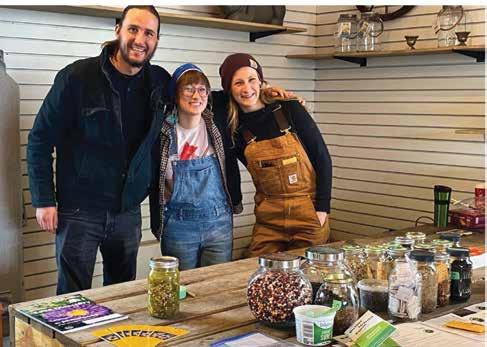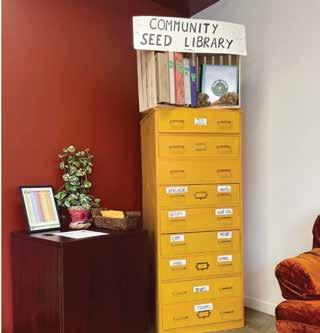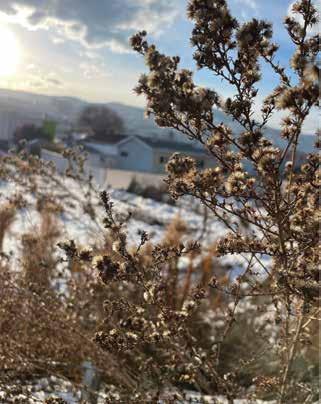
2 minute read
Kamloops Community Seed Library

By Eden Mackay, Horticulturist and Board Director for the Kamloops Food Policy Council
Advertisement

The Kamloops Community Seed Library is a program run by the Kamloops Food Policy Council (KFPC) along with The Butler Urban Farm (BUF) that has been facilitating the sharing of community seed since its launch in 2018.
Over the winter we have been working hard to process, sort and label our seed catalogue in preparation for the spring. While the KFPC has been collecting and distributing seeds within our network and extended community for some time now, this is the first year that our library has a permanent location in The Stirfront, a local food store and community space run by the KFPC and funded by the Ministry of Agriculture, located at 185 Royal Ave. By redistributing locally grown seed and providing resources that encourage people to save their own seed, we are able to build food security for our region, while promoting investment in the ecological health of privately held lands.
For hundreds of years, farmers and gardeners have routinely saved seed to preserve a rich gene pool with thousands of heirloom varieties. Revitalizing this practice helps to protect varieties which are often lost when people forgo this tradition in favour of purchasing from commercial seed growers. It also enables us to uphold connections to our agricultural history and promote culturally appropriate foods.
According to Seeds of Diversity (a Canadian organization dedicated to preserving, studying, and encouraging the cultivation of heirloom and endangered food crop varieties), around 75 percent of global plant food varieties have gone extinct over the last 100 years. These heirloom seeds produce food that is more flavourful and nutrient dense than their hybrid counterparts. Mainstream seed varieties are bred for durability, long shelf life, or appearance, while most heirloom varieties are bred with canning, fresh eating, and flavour in mind. Encouraging the tradition of seed saving reduces our dependence on genetically modified and/or hybridized seed (hybrid seed is created by crossing two different species - creating seeds that generally do not produce offspring with the same traits as the parent plant), and encourages genetic adaptation that is able to withstand unpredictable climatic shifts. This is especially important as our ever-changing climate plays a major role in environmental and economic stressors to our food systemthink wildfires, floods, droughts, etc.
In Canada, we have a rich history of urban agriculture through initiatives such as Wartime Victory Gardens, Great Depression Relief Gardens, Community Gardening, and SPIN (Small Plot Intensive) Farming. These practices have become less common due to issues around land access, education, and resources, but are currently experiencing a cultural revitalization as we grapple with the rising cost of food. More people are ripping up their lawns to grow food - a trend that will help to reduce our grocery bills while providing habitat and food for birds, small animals, and insects. Of the most popular garden vegetables, the easiest seeds for beginners to save are peas, tomatoes, and beans. Seeds of Diversity sells a handbook for small-scale seed production on their website that explains different standards, best practices for producing top-quality seeds, and tips for cleaning and storing, which is a great resource with which to start.
Thanks to the support of Urban Systems, the Kamloops Community Seed Library is the proud owner of a thresher and winnower, which allows us to clean large amounts of seed in a short period of time. Growers with a large amount of seed can have us clean it for them in exchange for a donation to our seed library.
Last year we grew out and saved over twenty different seed varieties at The Butler Urban Farm. We also added to our collection by cataloging seed donations, and this year we have incorporated a selection of sustainably and ethically sourced seed varieties that are native to the Kamloops region. We offer workshops and demonstrations on seed cleaning and saving, and will be hosting drop in hours at The Stir (185 Royal Ave) from February to April. On March 11th we will be at Seedy Saturday at the Mount Paul Community Food Centre (140 Laburnum St.) from 10 a.m. - 3 p.m. To find out more about our program, dropin hours, donating seed, workshops, and to view our seed catalogue, visit kamloopsfoodpolicy council.com/seedlibrary/.



